|
|
|
Sort Order |
|
|
|
Items / Page
|
|
|
|
|
|
|
| Srl | Item |
| 1 |
ID:
113270
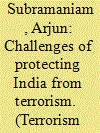

|
|
|
|
|
| Publication |
2012.
|
| Summary/Abstract |
The secular, pluralistic, ethnically diverse, and vibrant democracy that India has nurtured ever since its independence in 1947 has become the envy of many radical and extremist ideologies and religions that seek to bring in order through tools of fourth generation warfare like Jihad and "Proxy War." Typical examples of such conflicts facing India are the ones being waged against her by Jehadi organizations like the Lashkar-e-Taiba and other proxy factions supported by the Pakistan Inter Services Intelligence Agency. Despite a few pro-active measures instituted by the government of India after the 26/11 Mumbai attacks, there is no clear counter-terrorism policy that has been articulated either in the form of a doctrine or white paper. If India has to dispel the image of being a "soft state," it is imperative that the government clearly spells out its stand on terrorism.
|
|
|
|
|
|
|
|
|
|
|
|
|
|
|
|
| 2 |
ID:
113273


|
|
|
|
|
| Publication |
2012.
|
| Summary/Abstract |
This article seeks to provide results from an investigation into the impact of dependent citizen journalism on the publicity of terror. In the past, many academics have identified the importance of publicity to an act of terror drawing on the concept of "propaganda by deed." This article presents results of a study into the impact of a distinct form of journalism in the digital era, dependent citizen journalism, on the publicity of terror. The argument is put forth that dependent citizen journalism generates distinctive, additional publicity to a terrorist attack. The article seeks to show how this publicity differs and what negative consequences there are to the involvement of dependent citizen journalists in the reporting process.
|
|
|
|
|
|
|
|
|
|
|
|
|
|
|
|
| 3 |
ID:
113274
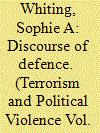

|
|
|
|
|
| Publication |
2012.
|
| Summary/Abstract |
In modern day Irish republicanism, "dissident" is a vague and imprecise term. It is utilised by the media and mainstream politicians to collectively label a broad range of groups and individuals who reject that participation in constitutional politics, in its current form, will achieve their ultimate goal of a United Ireland. This article investigates the discourse from the mainstream media and politicians surrounding dissident groups in order to explore the construction of the "dissident" profile. The piece then considers the composing and transporting of the political messages from two republican groups, Republican Sinn Fein (RSF), and the 32 County Sovereignty Movement (32CSM). This article undertakes a content analysis of the two group's newspapers (Saoirse and Sovereign Nation) over a time period of seven years and will question how "dissidents" attempt to defend and justify their position in relation to this mainstream media narrative, assessing how dissidents attempt a counter-narrative. The aim of such analysis is to discover more about how "dissidents" attempt to portray themselves and justify their position on the republican spectrum.
|
|
|
|
|
|
|
|
|
|
|
|
|
|
|
|
| 4 |
ID:
113269


|
|
|
|
|
| Publication |
2012.
|
| Summary/Abstract |
Despite an increasing number of attacks by violent anti-Good Friday Agreement (GFA) Republicans from 2009 there is still relatively little understanding of the nature of these organizations or the likely longevity of their campaign(s). This analysis argues that the current upsurge of violence is likely to continue for the foreseeable future, due to a combination of factors that entrench republican ideology. The fractured nature of anti-GFA groups and the declining stature of the Provisional movement are key factors that energize anti-agreement sentiment. In particular, this study identifies the Internet as one of the most significant emerging drivers in that it has the potential to sustain social networks that create and reinforce a traditional minded Irish Republican constituency implacably committed to using violence in pursuit of its goals.
|
|
|
|
|
|
|
|
|
|
|
|
|
|
|
|
| 5 |
ID:
113272
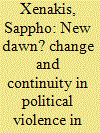

|
|
|
|
|
| Publication |
2012.
|
| Summary/Abstract |
With the arrest and conviction of members of the Greek Revolutionary Organization 17 November in the early 2000s, the chapter appeared to be closing on one of the last of a generation of urban guerrillas in Western Europe. Before the end of that decade, however, not only had a new batch of violent political organizations arisen in Greece, but the country had also experienced its worst social unrest in over thirty years. With a view to helping fill an emerging descriptive and analytical gap, this article summarizes key features of political violence in Greece between 1974 and 2011, and highlights the importance of three factors to explaining the resumption of organized political violence in the 2000s: the socio-economic environment, the treatment of radical demands by the political system, and the dynamics of violence between the state and non-state groups. In so doing, the article includes an unprecedented account of the role of the state and far-right organizations in the escalation of political violence in Greece. The article goes on to critically review expert, political, and media accounts of the evolution of political violence in the country, and concludes by considering pertinent policy implications.
|
|
|
|
|
|
|
|
|
|
|
|
|
|
|
|
| 6 |
ID:
113271
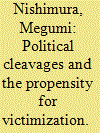

|
|
|
|
|
| Publication |
2012.
|
| Summary/Abstract |
Do victims have particular demographic characteristics that differentiate them from non-victimized persons? Does ethnicity delineate between the victims and the non-victims of violence during armed conflicts, as the media often claims? Have the political cleavages dividing the communities increased the severity of violence? This study addresses these issues by analyzing data from "the People on War project" (the PoW project) through latent class analysis (LCA). Data were collected by the International Committee of the Red Cross (the ICRC) at the 50th anniversary of the signature of the Geneva Conventions in 1999 throughout twelve armed conflict zones in the world.
[Supplemental materials are available for this article. Go to the publisher's online edition of Terrorism and Political Violence for the following free supplemetal resources: Table 2: Exposed Risk of Violence During Armed Conflict and Demographic Factors (With Regional Values), and Table 3: Risk of Violence During Armed Conflict and Demographic Factors (% Having Taken Sides)].
|
|
|
|
|
|
|
|
|
|
|
|
|
|
|
|
| 7 |
ID:
113268
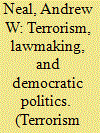

|
|
|
|
|
| Publication |
2012.
|
| Summary/Abstract |
Counterterrorist law is all too often made in a rushed, reactive, and repetitious way, marginalizing the deliberative, critical, and democratic functions of legislatures and leading to outcomes that later prove to be unconstitutional and counter-productive for public security. Using a political sociology approach, the article offers an analysis and theorisation of the practice of counterterrorist lawmaking. Through the UK example, the article argues that counterterrorist lawmaking compounds the existing unequal power relationships of the parliamentary field, and presents legislators with an inscrutable dilemma about the true stakes involved in legislative security politics.
|
|
|
|
|
|
|
|
|
|
|
|
|
|
|
|
|
|
|
|
|